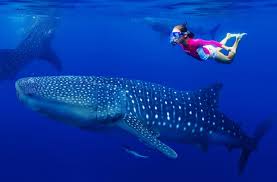For years, a controversial activity has persisted in the lagoons of Mauritius: swimming with whales and sperm whales. Although strictly prohibited by law, this practice continues to attract growing numbers of tourists and boat operators.
Legally, only whale watching — the respectful observation of marine mammals from authorized boats — is permitted. Yet since 2020, the number of operators offering unauthorized swimming trips has skyrocketed, creating a highly lucrative parallel industry. This form of “wild tourism,” long denounced by NGOs, exposes marine mammals to relentless harassment on a daily basis.
Eco-Sud Takes Legal Action against swimming alongside whales
Marine wildlife expert Hugues Vitry warns of the constant disturbance whales endure in Mauritian waters. In response, the NGO Eco-Sud has decided to escalate the fight. On August 27, 2025, it filed an injunction with the Supreme Court against 23 local and international actors allegedly involved in this illegal trade.
The defendants include boat operators, skippers, renowned freediving instructors, underwater photographers, sea guides, influencers, and tourism company directors. This case is unprecedented in scope, targeting a wide network of players for the first time.
The judge, while acknowledging the urgency, declined to issue an ex parte injunction and opted instead to hear the defendants before ruling. Eco-Sud is seeking an immediate suspension of these activities, pending a broader civil liability case. In its main action, the NGO also intends to pursue the Tourism Authority, accused of willful blindness, and the Ministry of Fisheries, criticized for failing to enforce the Fisheries Act 2023, which explicitly prohibits harassment of whales, sperm whales, and turtles.
Daily Harassment of Cetaceans
Eco-Sud’s press release paints a stark picture. Behind the façade of “sustainable” or “respectful” tourism, the reality is one of daily harassment: dozens of boats and hundreds of swimmers surrounding marine mammals, heavily promoted on social media as an exotic adventure.
The NGO describes a sprawling, international industry whose aggressive marketing draws thousands of tourists to Mauritius each year. The consequences for marine life are severe:
- Physical injuries from boat propellers.
- Disturbance of vital behaviors such as feeding, socializing, mating, and nursing.
- Increased stress and energy expenditure, reducing life expectancy and reproductive success.
Research by the Mauritius Marine Megafauna Conservation Organization indicates a troubling decline in local sperm whale populations: from around 30 individuals before 2022 to just 25 by the end of 2024. Graphic images of calves with head injuries, widely shared online, have shocked the public and underscored the urgency of the situation.
A Call for Urgency
For Hugues Vitry, the warning signs are clear:
“Whales and sperm whales are mammals, not fish. They are harassed all day long — they cannot feed, nurse their young, or live in peace. If this continues, they will abandon Mauritian waters altogether.”
The drop in recorded sperm whales, from 55 in earlier surveys to barely 25–30 today, is cited as evidence of the direct impact of unchecked tourism.
Sébastien Sauvage, president of Eco-Sud, also stresses the need for immediate action:
“For ten years, we have been saying this is illegal. Yet the practice continues, harming not only whales but also dolphins and turtles. The law exists, but why is it not enforced? We need a real shift in mentality.”
Beyond Tourism: A Global Responsibility
Whales play a crucial role in the balance of marine ecosystems: promoting phytoplankton growth, regulating nutrient cycles, storing carbon, and contributing to oxygen production. Their disappearance or displacement would represent an irreplaceable ecological loss.
Eco-Sud accuses the authorities of passive complicity, pointing to years of inaction despite clear legislation. The NGO does, however, note recent positive signs: a willingness by the new leadership of the Tourism Authority to engage NGOs in future reforms, and some limited operations at sea supported by the National Coast Guard. Still, the organization insists that the battle is fought as much on social media, where illegal operators continue to promote their activities unchecked.
A Turning Point for Mauritius
The injunction before the Supreme Court may take time given the number of defendants, but it marks a critical step in the fight against this illicit industry. For NGOs, the case will test the true commitment of Mauritian institutions to enforce environmental laws and protect marine mammals.
Ultimately, what is at stake goes far beyond tourism revenues: it is Mauritius’s credibility in safeguarding biodiversity and managing its natural resources that now hangs in the balance.
For tourists, it’s requested that please help save marine life and do not indulge in this practice.

This deeply concerning article highlights the devastating impact of unchecked tourism on whales in Mauritius. The scale of harassment is shocking, and its urgent that both tourists and authorities act to protect these vulnerable creatures and their habitats.SunPerp